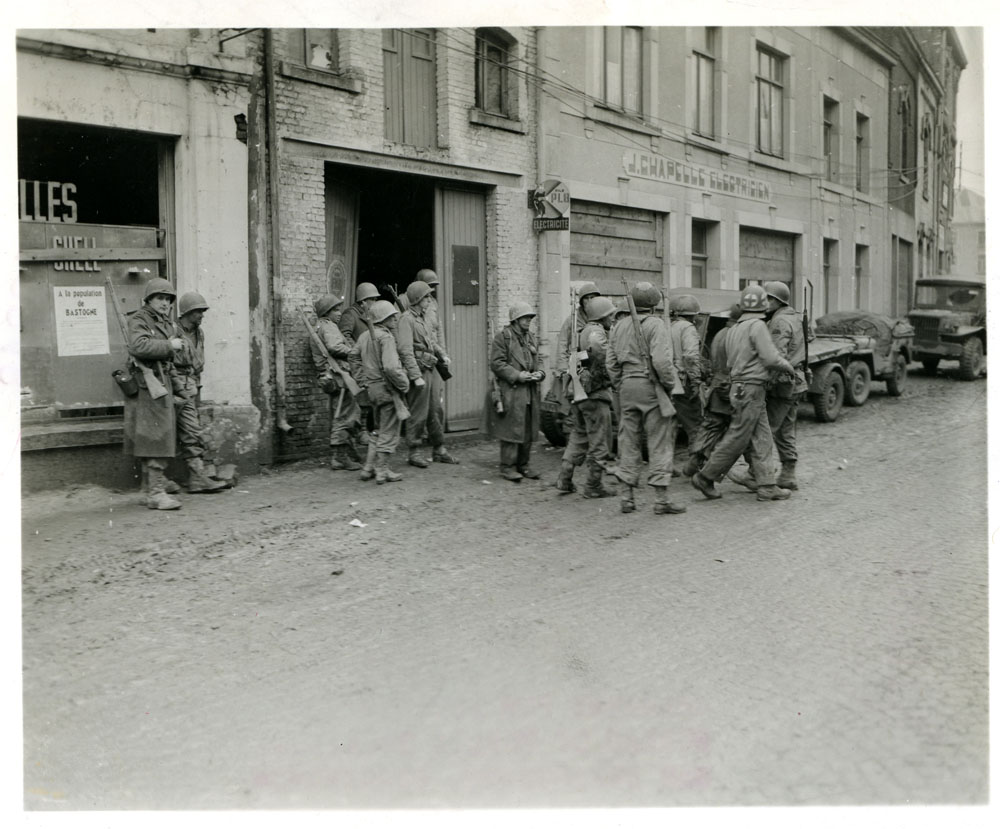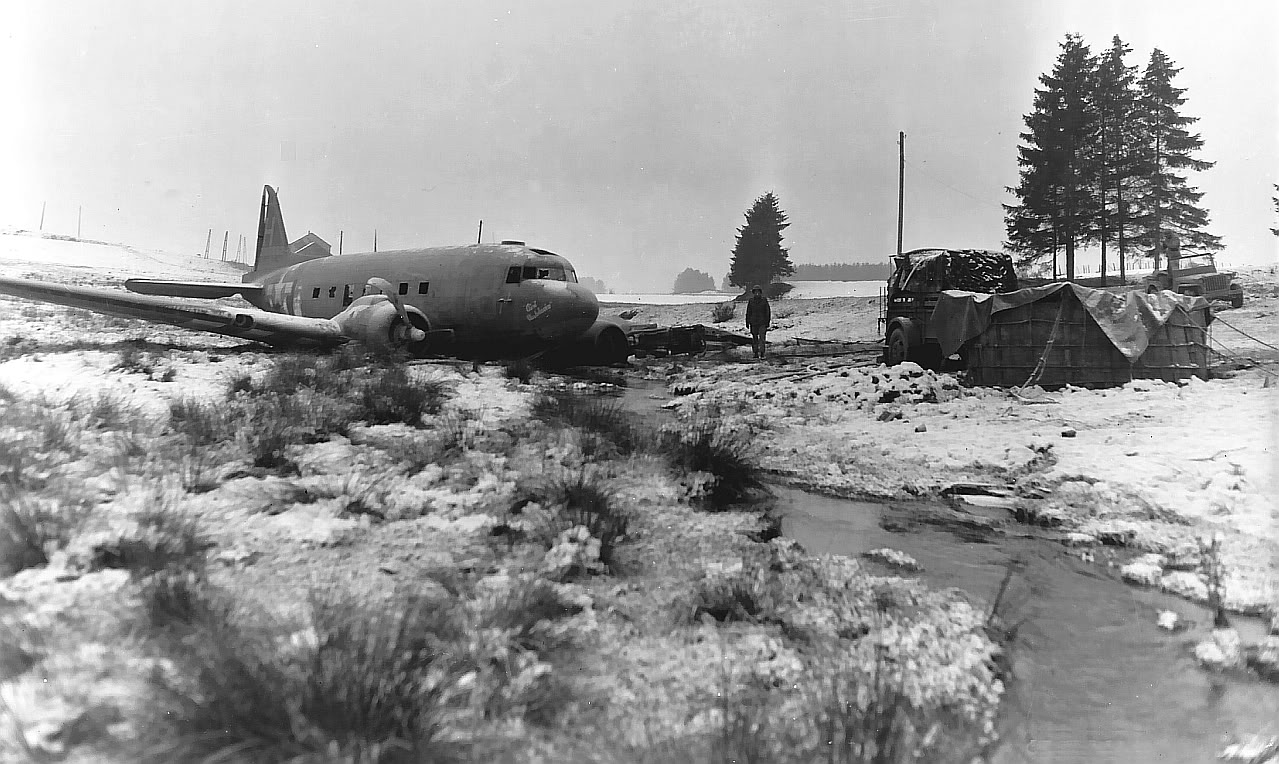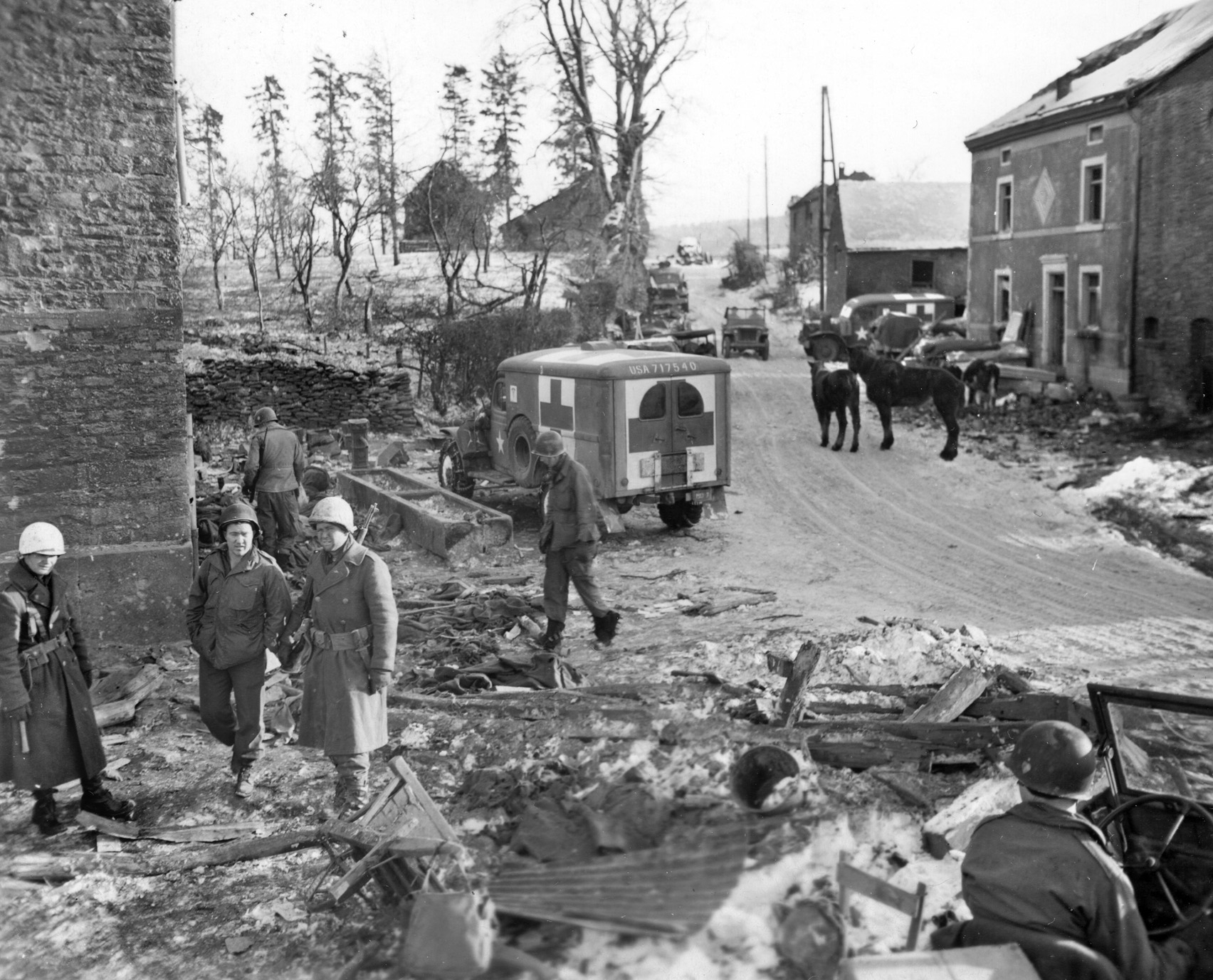Bastogne, Belgium 1944 r/OldSchoolCool

A scratch force of an American armored division held a German panzer division at bay north of Bastogne during World War II. This article appears in: Spring 2018. By Kevin M. Hymel. It was December 19, 1944, one day before the Siege of Bastogne. Shortly after 10:30 am, 26-year-old Major William Desobry picked up his field telephone, called his.
Troops Regrouping in Bastogne The Allied Race to Victory World War II Exhibit Pritzker

World War II: Pathfinders Resupply 101st Airborne Division Troops in Bastogne Via Daring Parachute Drop The daring parachute drop by 20 pathfinders was critical to the defense of the town of Bastogne in December 1944. by HistoryNet Staff 6/12/2006 National Archives
Battle of Bastogne World War 2 Facts

by Albin F. Irzyk 8/19/1999. Just before dark on the day after Christmas 1944, elements of Lieutenant General George S. Patton, Jr.'s 4th Armored Division, attacking from the south, succeeded in making contact with the beleaguered Americans at Bastogne. The encircled 101st Airborne Division had occupied that critically vital Belgian town for.
Image Bastogne, 1944.jpg World War II Wiki FANDOM powered by Wikia

Bastogne, a small town in southern Belgium, sits in rolling farmland, surrounded by stands of the Ardennes forest. It likely would have remained unknown to the world, but Bastogne suffered the misfortune of being caught in the Battle of the Bulge, one of the largest land battles of World War II.
DVIDS Images WW2 Battle of the Bulge's commemoration in Bastogne [Image 5 of 35]

The Battle of Bastogne was a battle between American and German forces at the town of Bastogne in Belgium from the 20th to the 27th of December 1944, it was part of a more extensive operation, the Battle of the Bulge. The battle is also known as the Siege of Bastogne.
Bastogne Forest Gunfire World War 2 Winter snowy afternoon YouTube

The Battle of Bastogne, in Belgium, was part of the larger Battle of the Bulge during WWII that left an indelible mark on this town of 15,000. A tour through Bastogne will enable the visitor to ponder the absolute devastation incurred during the siege of Christmas in 1944.
Bastogne 1944. Wwii history, World war two, World war i

Anthony McAuliffe (centre) and his officers in Bastogne, Belgium, December, 1944. The commander of the U.S. Army's 101st Airborne would go down in history for his defiant, one syllable reply to a German surrender ultimatum.. Battlefield Stalingrad — Four Maps That Tell the Story of World War Two's Pivotal Struggle.
Explore Bastogne Through Historic Traces Of World War II

On December 22, 1944, German Gen. Heinrich Freiherr von Lüttwitz sent the US forces his demands, telling them the only possible way to save themselves from complete annihilation was an honorable surrender, wherein they gave up Bastogne.
Bastogne 1944 Wwii, World war two, World war

The 463rd remained in Hemroulle providing support fire around the perimeter of Bastogne until January 15, 1945, when it joined the 101st in its final push into Germany. On January 31, Cooper received orders to transfer his command to the 17th Airborne Division, the unit his battalion was originally designated to join.
DVIDS Images WW2 Battle of the Bulge's commemoration in Bastogne [Image 1 of 35]

Anthony Clement " Nuts " McAuliffe (July 2, 1898 - August 10, 1975) was a senior United States Army officer who earned fame as the acting commander of the 101st Airborne Division defending Bastogne, Belgium, during the Battle of the Bulge in World War II. He is celebrated for his one-word reply to a German surrender ultimatum: "Nuts!"
bastogne2

Brigadier General Anthony McAuliffe and his staff gathered inside Bastogne's Heintz Barracks for Christmas dinner December 25th, 1944. This military barracks served as the Division Main Command Post during the siege of Bastogne, Belgium during World War II.
[Photo] Troops of US 101st Airborne Division moving out of Bastogne, Belgium, 31 Dec 1944

The siege of Bastogne ( French pronunciation: [bas.tɔɲ] ⓘ) was an engagement in December 1944 between American and German forces at the Belgian town of Bastogne, as part of the larger Battle of the Bulge. The goal of the German offensive was the harbor at Antwerp.
Easy Company Mortarman in Bastogne Warfare History Network

World War II Siege of Bastogne Liberated by the Allies on 10 September 1944, Bastogne was attacked by German forces a few months later. Hitler 's plan was to regain control of the Ardennes, splitting British from American forces, then advance to and reoccupy the strategic port of Antwerp and cut off the key Allied supply line.
[Photo] Men of US 28th Infantry Division marching down a street in Bastogne, Belgium, 20 Dec

Bastogne War Museum - The Second World War museum in Belgium Your day at the Bastogne War Museum Discover the history of the Battle of the Bulge, the Generations45 experience and the immersive Bois Jacques Book your visit Wednesday 10 January Closed -4 / -4 Saturday 06 January 9:30am to 6:00pm 1 / 1 Sunday 07 January 9:30am to 6:00pm -3 / -3 Monday
🇺🇸🦅Ardenne battle, 1944 History war, World war two, Bastogne

To view the World War II 75th commemoration Web site and affiliated publications, please visit the U.S. Army Center of Military History home page: www.history.army.mil. Bastogne, 2 Jan 1945 Facts: 610,000 U.S. Soldiers 242 Sherman Tanks 182 Tank destroyers 394 Artillery 75,000 Casualties
Pin on U.S. 6th Armored Division

Bastogne, a historically significant town located in the Ardennes region of Belgium, played a crucial role in the Battle of the Bulge during World War II.